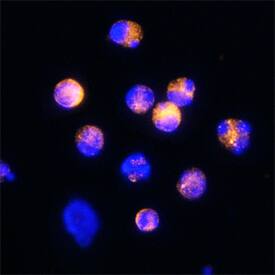Mouse CD160 Antibody
R&D Systems, part of Bio-Techne | Catalog # MAB38991

Key Product Details
Species Reactivity
Mouse
Applications
Immunocytochemistry
Label
Unconjugated
Antibody Source
Monoclonal Rat IgG2A Clone # 342705
Product Specifications
Immunogen
Mouse myeloma cell line NS0-derived recombinant mouse CD160
Gly28-Ser160
Accession # AAH21596
Gly28-Ser160
Accession # AAH21596
Specificity
Detects mouse CD160 in direct ELISAs.
Clonality
Monoclonal
Host
Rat
Isotype
IgG2A
Scientific Data Images for Mouse CD160 Antibody
CD160 in Mouse Splenocytes.
CD160 was detected in immersion fixed CD8+mouse splenocytes using Rat Anti-Mouse CD160 Monoclonal Antibody (Catalog # MAB38991) at 25 µg/mL for 3 hours at room temperature. Cells were stained using the Northern-Lights™ 557-conjugated Anti-Rat IgG Secondary Antibody (yellow; Catalog # NL013) and counterstained with DAPI (blue). Specific staining was localized to plasma membranes and cytoplasm. View our protocol for Fluorescent ICC Staining of Non-adherent Cells.Applications for Mouse CD160 Antibody
Application
Recommended Usage
Immunocytochemistry
8-25 µg/mL
Sample: Immersion fixed CD8+ mouse splenocytes
Sample: Immersion fixed CD8+ mouse splenocytes
Formulation, Preparation, and Storage
Purification
Protein A or G purified from hybridoma culture supernatant
Reconstitution
Sterile PBS to a final concentration of 0.5 mg/mL. For liquid material, refer to CoA for concentration.
Formulation
Lyophilized from a 0.2 μm filtered solution in PBS with Trehalose. *Small pack size (SP) is supplied either lyophilized or as a 0.2 µm filtered solution in PBS.
Shipping
Lyophilized product is shipped at ambient temperature. Liquid small pack size (-SP) is shipped with polar packs. Upon receipt, store immediately at the temperature recommended below.
Stability & Storage
Use a manual defrost freezer and avoid repeated freeze-thaw cycles.
- 12 months from date of receipt, -20 to -70 °C as supplied.
- 1 month, 2 to 8 °C under sterile conditions after reconstitution.
- 6 months, -20 to -70 °C under sterile conditions after reconstitution.
Background: CD160
References
- Cai, G. & G.J. Freeman (2009) Immunol. Rev. 229:244.
- del Rio, M.L. et al. (2010) J. Leukoc. Biol. 87:223.
- Maiza, H. et al. (1993) J. Exp. Med. 178:1121.
- Anumanthan, A. et al. (1998) J. Immunol. 161:2780.
- Maeda, M. et al. (2005) J. Immunol. 175:4426.
- Fons, P. et al. (2006) Blood 108:2608.
- Tsujimura, K. et al. (2006) Immunol. Lett. 48:106.
- Cheung, T.C. et al. (2009) Proc. Natl. Acad. Sci USA 106:6244.
Alternate Names
BY55, CD160, NK1, NK28
Gene Symbol
CD160
UniProt
Additional CD160 Products
Product Documents for Mouse CD160 Antibody
Product Specific Notices for Mouse CD160 Antibody
For research use only
